Ibaraki Plant (IP)
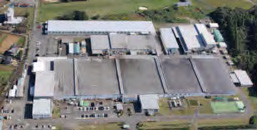
Production of high-pressure hoses, sealing materials
Total site area152,000m2
Number of employees275 (as of the end of December 2021)
Location1 Hatori-Nishi, Omitama City, Ibaraki 319-0198, JAPAN
Contact for consultation and complaintsTadashi Kamimura, Plant Management Division
Tel: +81-299-46-1111
Fax: +81-299-46-0235
E-mail: tadashi.kamimura@y-yokohama.com
Message from the General Manager
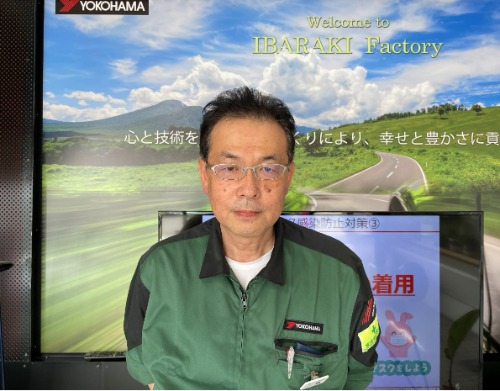
Takashi Kojima
The Ibaraki Plant started its operations in 1973 as an exclusive plant of high pressure hoses, one of the largest in Japan, and in 1997 it started plant operations for building sealing materials and has continued production until today.
While working on measures in accordance with Yokohama Rubber’s YX2023 Basic Policy so we become “a company having world-class strengths in technologies for protecting the environment”, in that we also aim to achieve harmony, fusion and coexistence with the abundant and beautiful nature of Ibaraki, the plant is promoting numerous regional and social contribution activities in addition to its environmental policies. With respect to reducing industrial waste, we have achieved results by strengthening team-improvement activities under the themes of reducing process nonconformities and improving materials and equipment management. As regards energy saving activities, all employees actively promote renewal of machinery and equipment by replacement with energy-saving models, increased energy saving awareness and paperless processes. The plant has been maintaining the highest AAA rank of the eco office registration system established by the prefecture.
Furthermore, the planting of trees at the plant, which began in 2008, was completed in 2012, we continue to grow seedlings. We donate these seedlings to both locally-held planting events.
As part of our biodiversity activities started in 2013, we have conducted bird watching, insect watching, and vegetation surveys inside the plant, as well as water quality and aquatic life surveys of the Sonobe River at the outlet of plant effluent three times a year to investigate the impact of the plant effluent on nature. Although we have recently suspended large-scale activities due to the impact of COVID-19, we have been publicizing these activities to the local community in order to improve communication.
Additionally, our biodiversity activities have been recognized, in that in 2019 we were certified by ABINC as a Living Creature Coexistence Office®.
We further strengthen our environmental management systems at the Ibaraki Plant, and push forward with the total-employee participation model, both with regard to those activities that make an environmental contribution, and with regard to the prevention of environmental trouble.
Organizational Governance
Decision-making processes and structures
The following three items have been established with respect to the structuring of the plant’s safety culture:
- Greet your guests properly
- Keep your appearance neat and tidy
- Be sure to point and call properly
With respect to the plant’s safety, environment and quality policies, such are established in accordance with corporate policy. Concerning their orientation, such is decided through the meetings system.
Human Rights
Consideration of human rights by suppliers
In February 2021, the 10th CSR study session was not held for COVID-19, and we sent study materials to our suppliers and collected questionnaires.
This time, the six items were as follows:
- Yokohama Rubber's CSR Activity Policy
- Green Procurement Guidelines
- Workplace Safety
- Information Security
- Introduction of Compliance Violation Cases
- Sustainability Initiatives with Our Suppliers
Complaint resolution
There were no reports submitted to the Corporate Compliance Department in 2021, and no consultations requested.
Labor Practices
Creating a safe and healthy workplace environment
Based on the recognition that the basis of corporate activity is assuring the safety and health of both our employees and those of cooperating companies, Occupational Safety and Health Management System (OSHMS) certification in accordance with Japan Industrial Safety & Health Association (JISHA) standards was obtained, and safety and health management has been implemented. This was done as a means by which to realize a safe, comfortable, and healthy workplace.
Safety management at each workplace is followed up at the Safety and Health Committee monthly.
This fiscal year, efforts have focused on improving the risk (pinching and entanglement) of power components such as lifting and lowering cylinders and rotating objects, particularly for achieving fundamental safety in plants.
Furthermore, we focused on education and training for basic operations (scalpel/knife, drum transportation, forklift, and crane operations) and competency assessment.
In addition, we have also focused on traffic safety education because the majority of employees commute to work by car, and we have worked to develop safe drivers and prevent accidents through means such as inviting external instructor to hold courses on traffic manners in an effort to improve driving manners.
Circle activities
Circle TPM improvement activities are being conducted to allow employees to make their own workplaces more comfortable and easier to work at. We are working to vitalize these activities through the holding of events including regular announcements on the results of improvements and bulletin board contests.
Human resources development and training
Work training is undertaken by our assignment of more senior workers to instruct both new hires and fixed-term employees. This one-on-one training increases individual skill levels because training results can be reviewed and revisited.
Promotion of employment of people with disabilities
As part of our promotion of the employment of disabled people, we currently have one disabled employees working actively in the plant.
We will continue to implement improvements to create a barrier-free workplace, so as to foster the employment of disabled people.
Work-life balance
Two days a week, Wednesdays and Fridays, have been established as days with specified hours for leaving work.
The Environment
Environmental data
Reductions in greenhouse gas emissions
Greenhouse gas emissions
Greenhouse gas emissions have been gradually decreasing since fiscal 2010.
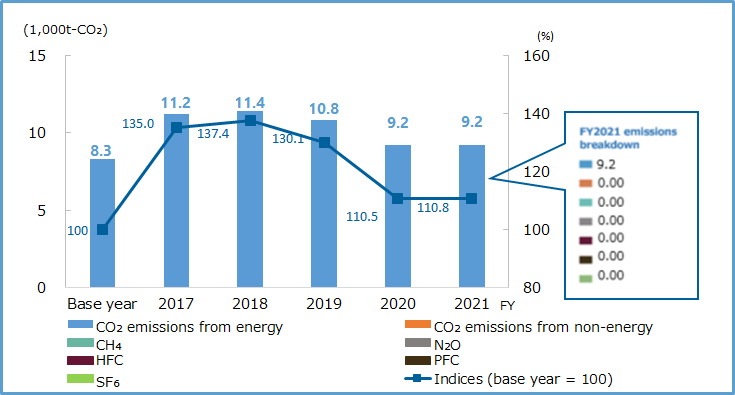
- The base year is defined as 1990 except for HFC, PFC and SF6, where the base year is 1995 as per the Kyoto Protocol.
- Method of calculation of greenhouse gases (GHG): this is in compliance with the “Calculation and Reporting Manual for Greenhouse Gas Emissions” issued by the Ministry of the Environment and the Ministry of Economy, Trade and Industry.
Note that GHG emissions associated with purchased power in FY2009 were calculated using the Table of Emission Coefficients by Power Company (Ministry of the Environment).
Effective use of resources / Reduction of waste
Waste output
From fiscal 2006, we have continued complete zero emissions.
Waste landfill
In fiscal 2007, we achieved a recycling rate of 100% and we have maintained that rate since.
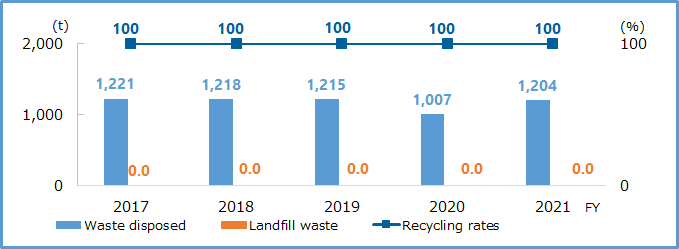
Water usage
The plant uses 400,000 tons of water a year.
Sources consist of underground water of about 90% and city waterworks of 10%.
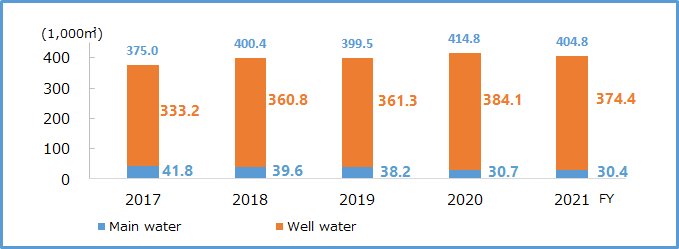
Measures for discharge into water, air and soil
Data related to water contamination
The plant discharges about 430,000 tons of wastewater a year into the Sonobe River.
Move the screen to the left or right to see the table information
| Item | Regulatory values | Voluntary standard values | FY2021 result | ||
|---|---|---|---|---|---|
| Average | Maximum | Minimum | |||
| pH | 5.8~8.6 | 6.7~8.2 | 7.6 | 8.1 | 6.7 |
| BOD concentration (mg/l) | 10 | 6.5 | 2.3 | 6 | 1.0 |
| COD concentration (mg/l) | 10 | 5.5 | 1.7 | 4.3 | 1.0 |
| SS concentration (mg/l) | 15 | 5 | 1.0 | 1.0 | 1.0 |
| Mineral oil concentration (mg/l) | 3 | 0.8 | 0.5 | 0.5 | 0.5 |
- Ibaraki Prefectural Ordinance and Environmental Protection Agreement with Omitama City
- Discharge point: Sonobe River
Soil contamination
We conduct groundwater analysis (shallow well) once a year and confirmed that the standard values were within the laws and the ordinances of Omitama City.
Air pollutants (NOx, SOx)
Measurements are conducted twice a year, and we have confirmed that the results are within the standards set out in all laws and in Omitama City Ordinances.
Move the screen to the left or right to see the table information
| Substance | NOx | SOx |
|---|---|---|
| Amount of emission (t/year) | 1 | 0.3 |
| Facility | Item | Regulatory values | Voluntary standard values | FY2021 result | ||
|---|---|---|---|---|---|---|
| Average | Maximum | Minimum | ||||
| Ibaraki Plant No.1-No.3 Boiler |
SOx emissions (K-value) NOx (ppm) Soot and dusts (g/m3N) |
17.5 260 0.3 |
10 or less 125 0.1 |
0.30 55 0.0015 |
0.48 72 0.003 |
0.19 33 0.001 |
- The Air Pollution Control Act and Environmental Protection Agreement with Omitama City.
Reporting on chemical substance management status (Pollutant Release and Transfer Register (PRTR) Law compliance)
The Ibaraki Plant verifies whether secondary materials and auxiliary materials contain chemical substances subject to Safety Data Sheet (SDS) requirements, and in the case of substances where the amounts handled exceed the thresholds specified by the PRTR Law, annual reports are submitted to the national (or prefectural) authorities and safety impact assessment is performed.
Regarding the handling of substances pursuant to the PRTR Law, please refer to the Safety Evaluation Table of Domestic Production Bases.
Noise reduction
Noises are measured at 15 places on the border of the plant premises once a month. We can confirm that the results are within the standards set out in Omitama City Ordinances (below 55db).
Preventing pollution
So as to prevent risks to the environment, once a year we conduct drills and tests in response to predicted emergency scenarios (such scenarios include oil leaks occurring from heavy oil storage tanks and solvent cans being upset during transportation, etc.).
Steps to reduce industrial waste
On the issue of reducing industrial waste, through our waste-reduction (MD) activities, we are revising the methods used to segregate waste within the plant and also promoting a paperless culture. Concerning auxiliary materials that are incidental to our products, we have obtained the EU ELV and RoHS Statement of Non-Inclusion Directives. Furthermore, goods that we purchase do not contain those substances that are subject to these provisions.
Alleviating and responding to climate change
As energy-saving activities, we have introduced LED lighting, and adopted the use of high-efficiency air conditioners and motors, along with promoting the application of heat-resistant and heat-retaining materials.
“Energy-saving Month” activities were implemented in February and August, with all employees participating in energy-saving promotion activities; a number of suggestions were put forward for reducing unnecessary energy wastage, and improvements were made.
Environmental protection, and recovery of natural habitats
Concerning the Sonobe River into which discharges from this plant flow, biodiversity protection surveys have been conducted at a frequency of two times a year. During these surveys, we have monitored water quality, aquatic life, plants and birdlife, etc. We have also taken steps to eliminate certain species of introduced plant and aquatic life.
In addition, starting in 2019, we have organized a new "Survey on the Living Environment of the Grey-faced buzzard (Butastur indicus) " to survey the vegetation and small animals (amphibians and reptiles) in the plant, focusing on the Grey-faced buzzard, which is as a Vulnerable, as one of the indicators for environmental conservation.
While taking measures to prevent the spread of COVID-19, we will continue to exterminate invasive species and conduct monitoring three times a year.
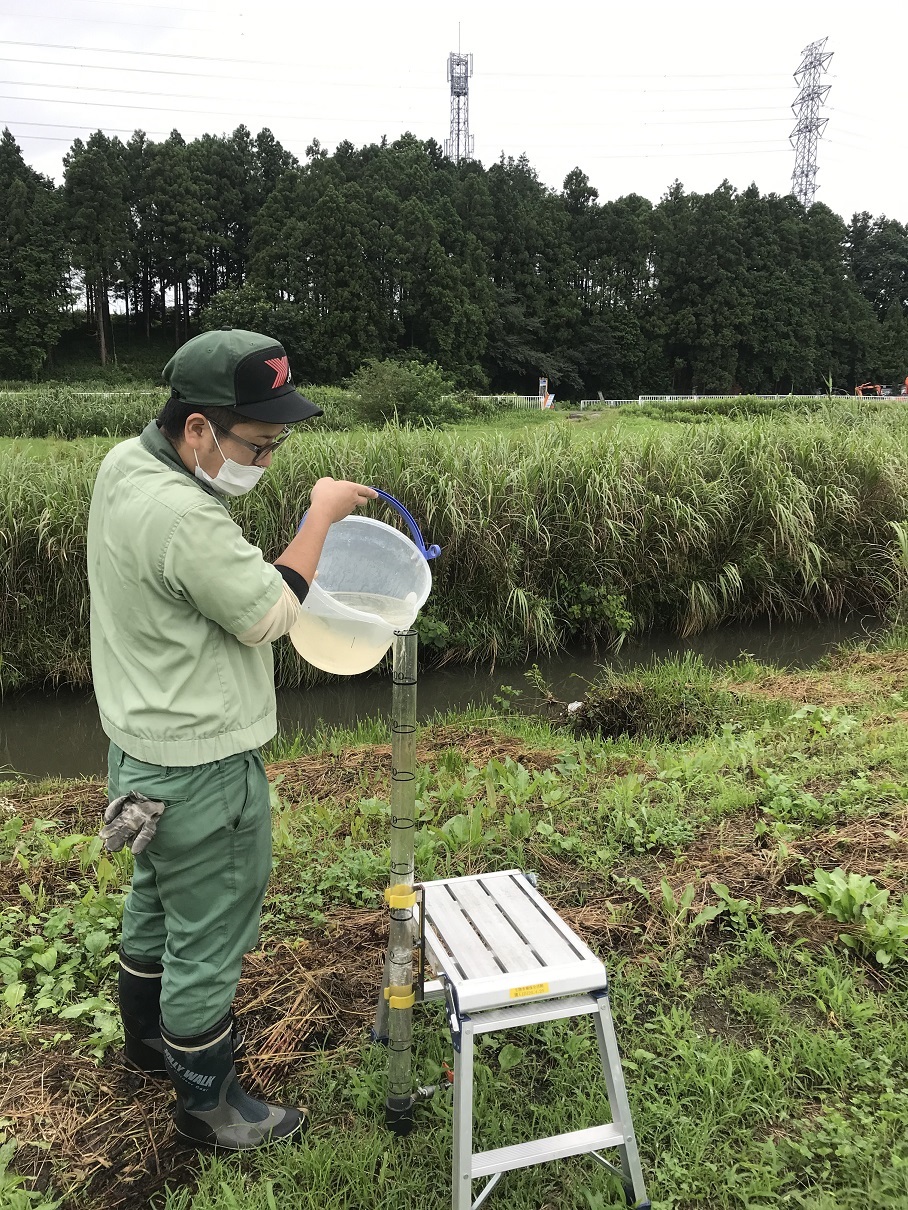
Water quality survey
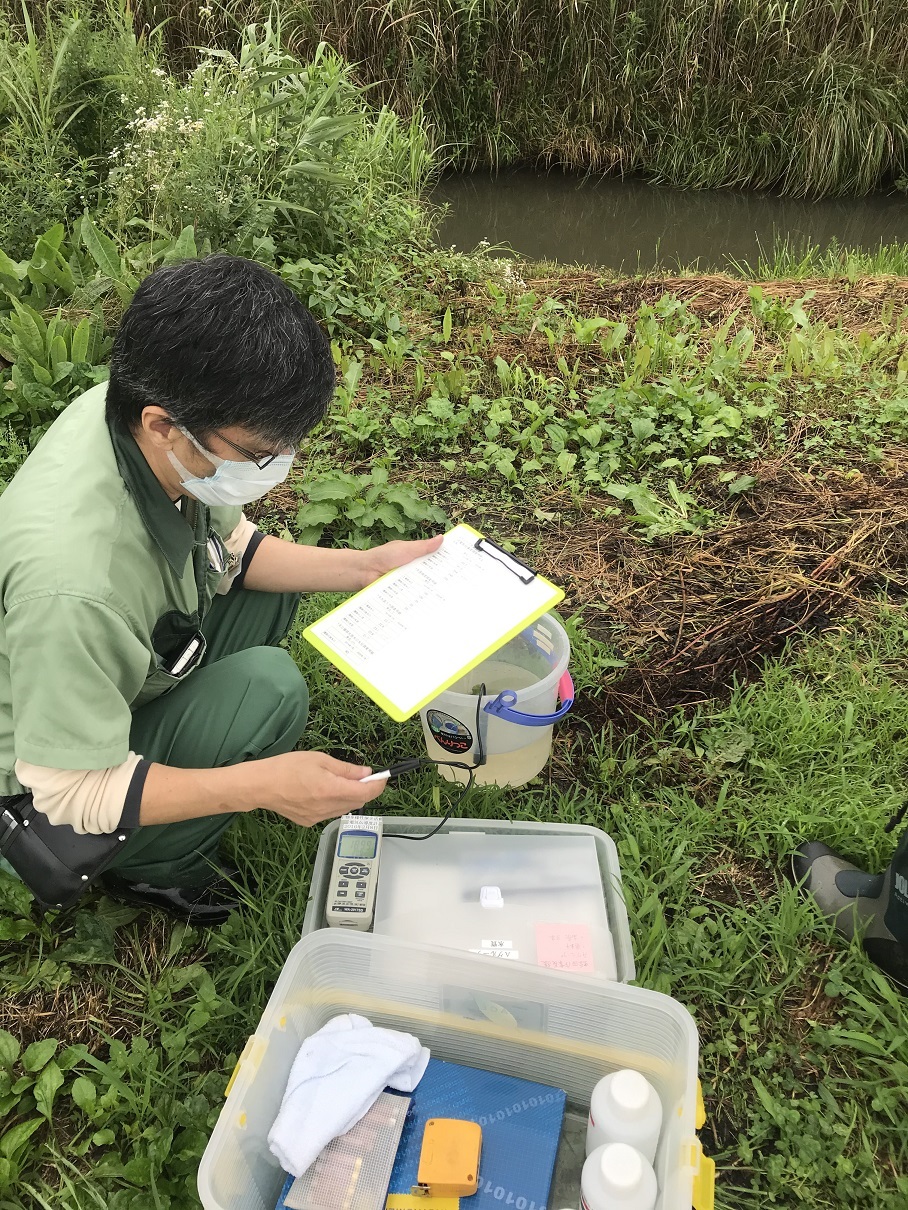
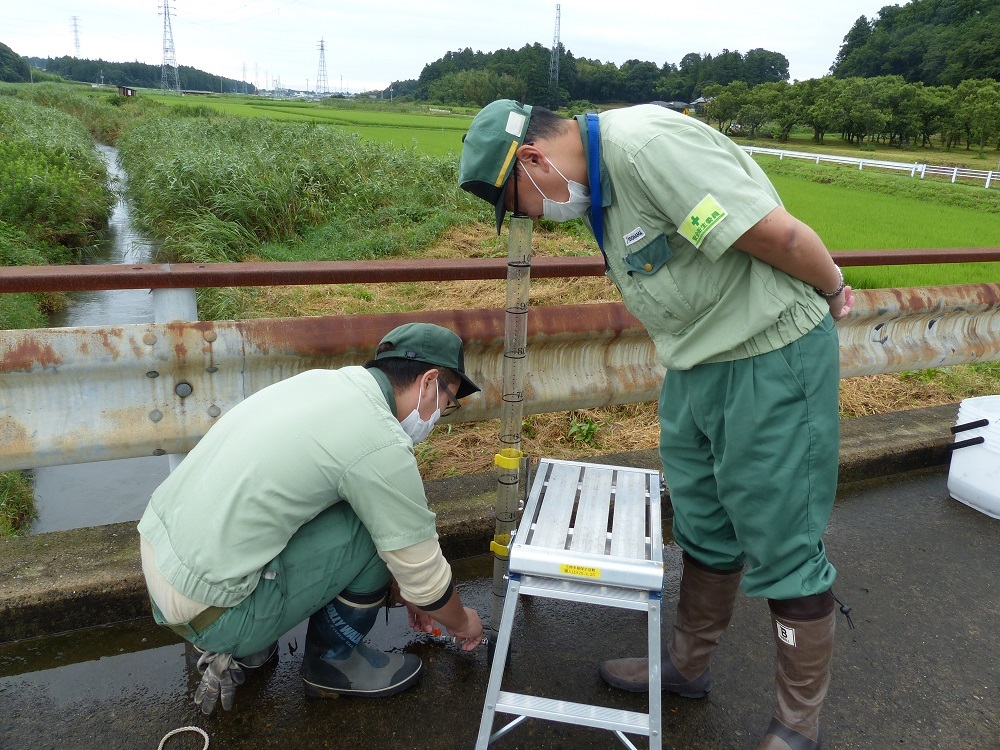
Water quality survey
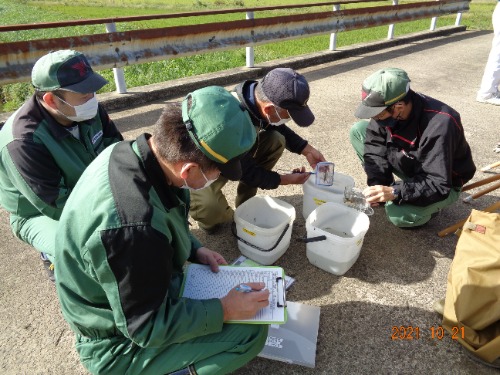
Confirmed inside the plant
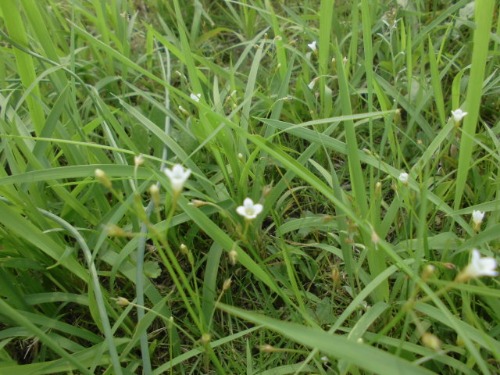
Rare plant (Ainae)
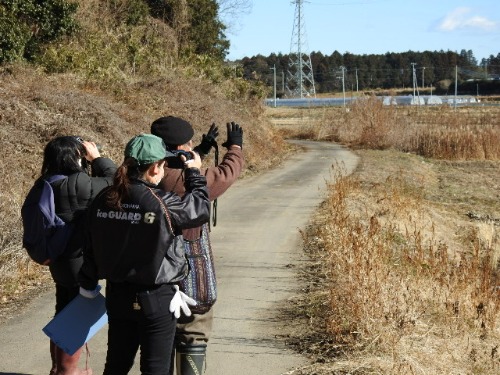
Bird survey
Fair Operating Practices
Thorough statutory compliance
The managers mainly responsible for placing orders with subcontractors have participated in seminars dealing with the improvement of subcontracting transactions. In addition, all personnel acting as subcontractor contact persons attended the subcontractor study sessions organized by the Indirect Materials Procurement Department that were held at the plant, reinforcing their understanding of legal requirements.
Consideration of supplier labor, safety and workplaces
Business dealings are conducted that are fair, transparent, openly competitive and suitable.
Thorough compliance
At the 9th CSR Study Meeting, the following information was shared.
- Yokohama Rubber's CSR Activity Policy
- Green Procurement Guidelines
- Workplace Safety
- Information Security
- Introduction of Compliance Violation Cases
- Sustainability Initiatives with Our Suppliers
As education within the company, we hold compliance seminars at a frequency of once a month.
Consumer Issues
Responses to complaints
If any complaints are raised about products, we quickly collect the actual item and investigate the causes and prepare reports to make a response satisfactory to the customer.
Community Involvement and Development
Coexistence and shared prosperity with the local community
We had planned to hold a round-table discussion on biodiversity conservation activities, but due to the outbreak of COVID-19, we decided to postpone the meeting in the plant and distribute related materials.
Employment creation
No new graduates were hired in 2021. Six mid-career hires were made. As part of our efforts to promote the employment of older people in the local community, the plant is currently employing five people introduced by the local Senior Human Resources Center.
Regional contributions
In FY2021, due to the outbreak of COVID-19, events such as the Fureai Plaza in Hatori district and the Fureai Festival in Omitama City, as well as the Otsuchi Gakuen "Hometown Department" tree-planting event, in which we are participating as volunteers, were cancelled.
A total of 845 seedlings were provided free of charge to Silva, a non-profit general incorporated association, in May, June and November.
The saplings were planted in the Shonan International Village Meguri-no-Mori project and Silva farmland.
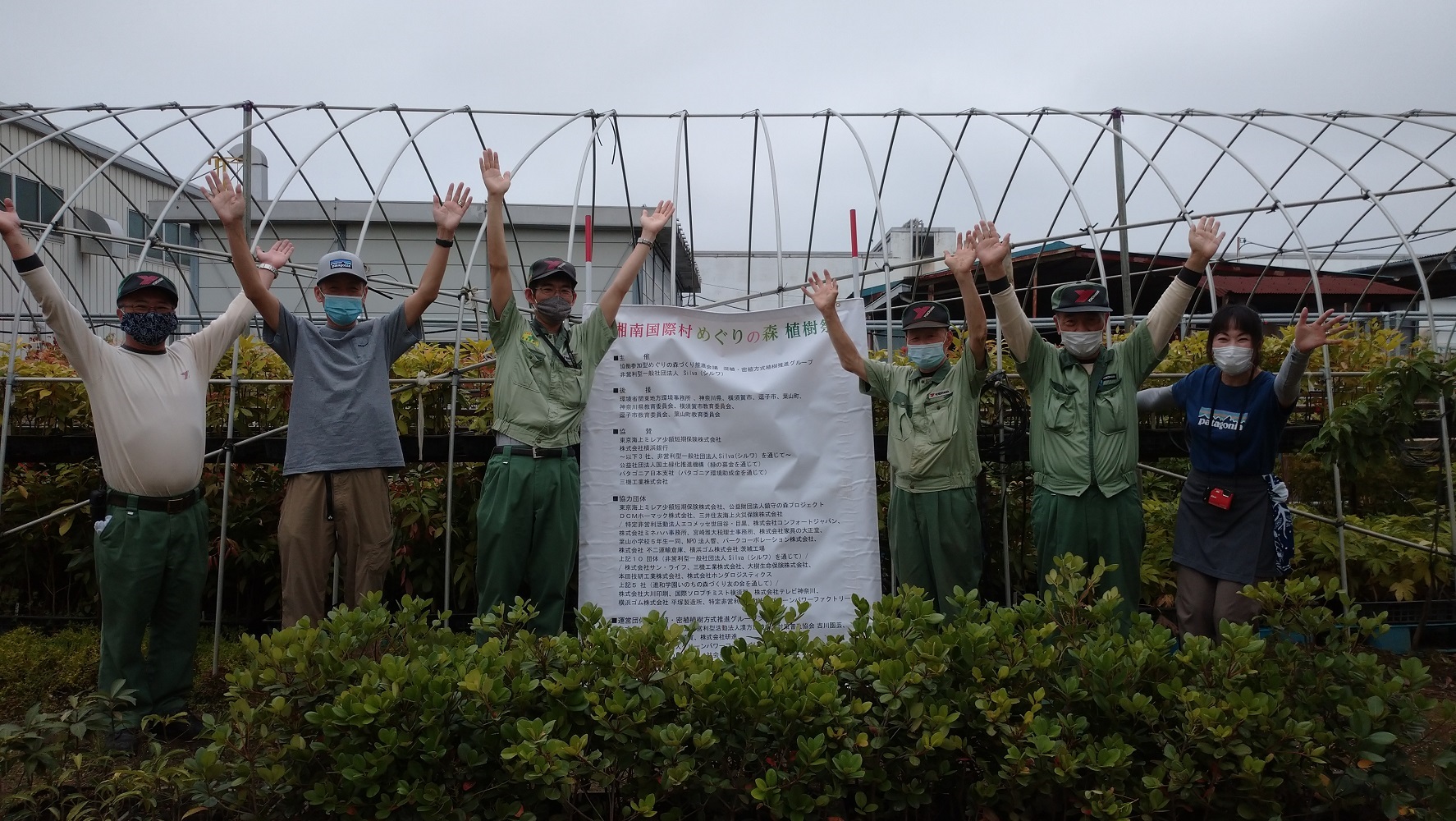
Providing seedlings to Silva
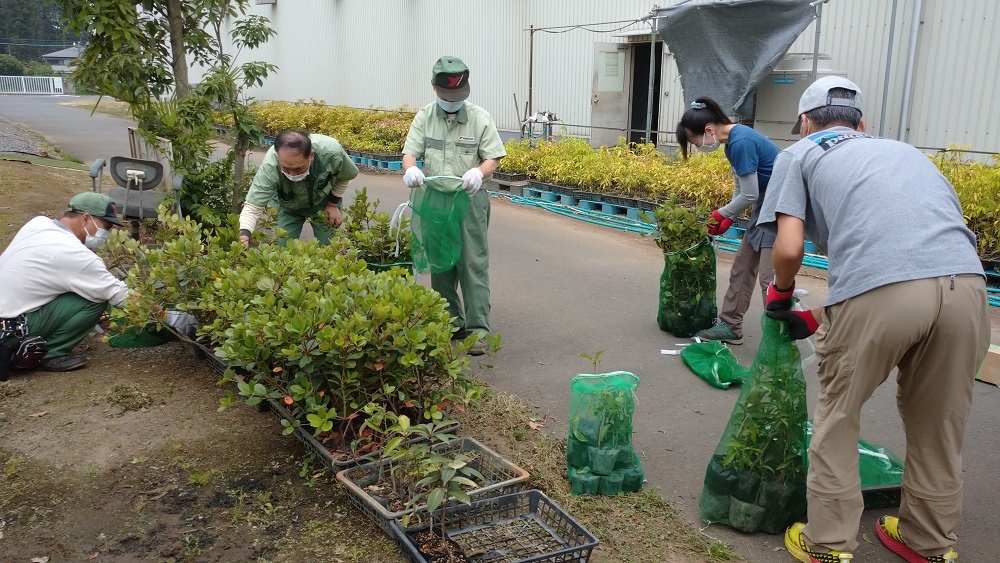
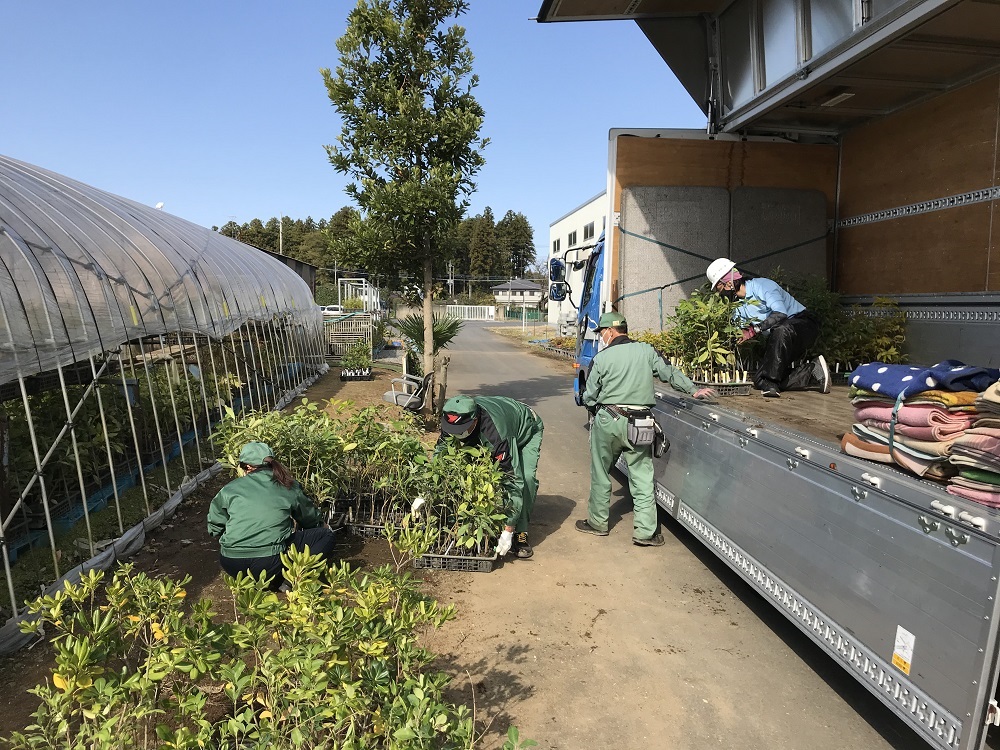
Providing seedlings to Silva
Discussion for local residents regarding our activities to help safeguard biodiversity
We had planned to hold a round-table discussion on biodiversity conservation activities, but due to the outbreak of COVID-19, we had to distribute related materials.
Relationship with local societies
As part of our efforts to foster close communication with local government authorities and local corporations, we attend the regular meetings of the local corporation association to exchange views and share information with the Mayor, local councilors and the managers of other local corporations. (The annual meeting of the Omitama City Business Association was held on February 6, with 25 representatives of 13 companies attending)
Plant tours
We only conducted a tour for job seekers (high school students) in July 2021.
While looking at the situation of COVID-19, we are being promoted to communicate with neighboring areas.


